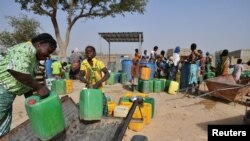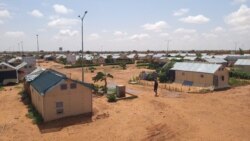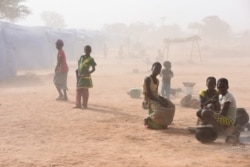The United Nations is warning that Africa’s Sahel region is facing a confluence of factors that are pushing the region deeper into poverty, hunger and the hands of extremists. The U.N. says that if the international community does not invest attention and money to stop the problem now, the consequences could spread beyond the region in the coming years.
“We may be approaching a tipping point beyond which it will be much, much, more difficult and expensive to change the trajectory,” U.N. humanitarian chief Mark Lowcock told VOA.
The broader Sahel — including the central border region between Mali, Burkina Faso and Niger, as well as the Lake Chad Basin of northeastern Nigeria, Cameroon, and Chad — has become one of the world's fastest-growing humanitarian crises.
Overall, the U.N. needs $1.4 billion for the region this year. About $550 million has been received so far — just under 40% of the appeal. A further $1.56 billion is projected to meet 2021 humanitarian needs.
Lowcock and other U.N. officials hope a donor’s conference Oct. 20, convened with Germany and Denmark and the European Union, can raise hundreds of millions of dollars to meet the most urgent and immediate needs, as well as spotlight an often-overlooked crisis and lead to a more sustained international commitment, to the region, that could head off a worse crisis down the road.
The Sahel is coping with unprecedented levels of displacement — 5 million people are displaced across the region — a million more than just 18 months ago. More than 14 million people are food insecure and 31 million need humanitarian assistance.
In Mali, Niger and Burkina Faso, attacks by armed groups on civilians are increasing — with more than 6,600 people killed in the past 12 months. Aid workers and their operations are also targets. More than 3,500 schools have closed due to insecurity, while 150 health centers are not functioning in the midst of the coronavirus pandemic.
In Burkina Faso, a country that has been on a rapid downward spiral, World Food Program chief David Beasley warns that in two northern provinces — Oudalan and Soum — “famine is actually knocking at the door.” He said about 11,000 people are at risk in these areas, but the WFP lacks access due to insecurity and cannot reach them to fully assess the situation.
The country is also experiencing the fastest-growing IDP crisis on the planet, with a 258% increase in internally displaced persons over the last 12 months. A year ago, Beasley said WFP was assisting 300,000 people each month there, but as the situation has worsened that number has skyrocketed to 1.2 million per month.
The growing needs mean the agency has a cash crisis. Beasley said without a swift $86 million injection, WFP would face a “pipeline” break — or complete cut of assistance — by November.
“As the needs are going up and the resources are going down with of the economic downturn because of COVID, it’s really going to present some challenges,” Beasley said. “But if we can get the money and get the access, we can avert famine and stabilize a lot of communities.”
The Sahel is rife with challenges — extremist and terrorist groups roam freely, people, guns and drugs are trafficked, the population is exploding, and the region is warming at twice the rate of the rest of the planet, causing droughts and floods that are hurting farmers and pastoralists. Hundreds of thousands of children are out of school because of insecurity and poverty, making them vulnerable to recruitment and sexual exploitation.
U.N. aid chief Lowcock said treating the symptoms with humanitarian aid is not a long-term solution; underlying causes must be addressed.
“This [conference] is an opportunity to stand back and look at the big picture, to raise money for the short-run problems on the humanitarian side, but also try to motivate people really to take much more concerted and effective actions within the countries themselves, at the national and local level, but also internationally to deal with the underlying causes,” he said.
He notes that dozens of other countries have managed to rise from poverty and similar challenges in recent decades and the Sahel can too, but there is no time to lose.






